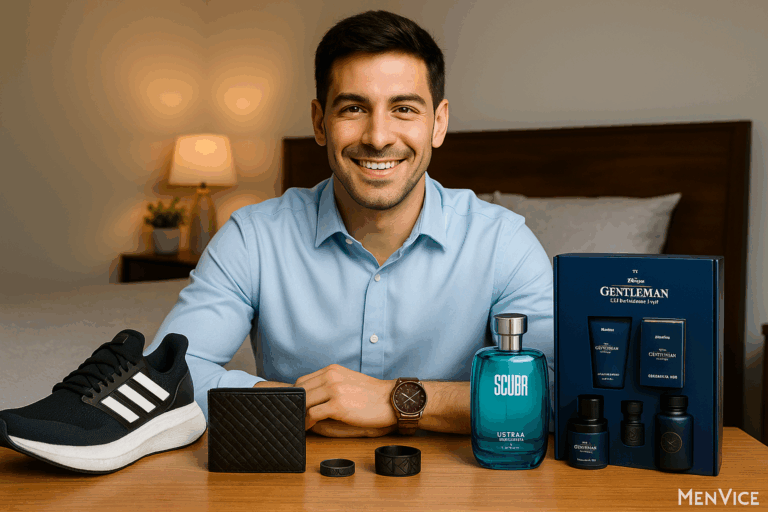
Elegance in Rebellion.
Own the Edge.
How I Fixed My Broken Sleep (And How It’s Changing My Life)

For as long as I can remember, sleep has been one of my biggest frustrations. People say, “Just sleep eight hours.” If only it were that easy.
My nights used to look like this:
- I’d go to bed around 11:30 or midnight, sometimes even earlier if I felt exhausted.
- But no matter what time I slept, I’d still wake up between 5:00 and 6:00 a.m. — and rarely later than that.
- Nights weren’t smooth either. I’d wake up several times, sometimes to use the washroom, sometimes for no reason at all.
The result? My days were foggy. I’d sit at my desk, yawning. I’d push through work, but focus was weak. My energy levels were never stable. And I’d keep telling myself, “Maybe tonight I’ll sleep better.” But it rarely happened.
I didn’t want to live like that anymore. So I decided to do something about it.
Step 1: Owning the Problem
The first thing I realized was that broken sleep isn’t just about being tired. It affects everything: focus, mood, productivity, even how sharp you look and feel.
Instead of brushing it off as “normal,” I treated it like a real problem to solve. That mindset shift mattered. I stopped waiting for sleep to magically improve and started actively experimenting with fixes.
Step 2: Small Changes to My Routine
I didn’t want to overhaul my entire life overnight. I started with manageable tweaks:
- Fixed bedtime routine
- I made it non-negotiable: screens off by 11, lights dimmed, and into bed.
- Even if I wasn’t fully sleepy, the consistency started training my body.
- Cooler room
- Dropping the bedroom temperature a little made falling asleep easier.
- Sometimes I’d even crack open a window for airflow.
- Water discipline
- One reason I kept waking up was bathroom breaks.
- So I cut off water intake an hour before bed. Simple change, big difference.
- Light exposure
- First thing in the morning, I made sure to step outside or at least get natural light on my face.
- It sounds small, but it helped regulate my body clock.
Step 3: Adding Melatonin
Here’s where I made the biggest breakthrough.
I started taking The Body Reserve Melatonin 10mg — a supplement designed for sleep support, nerve relaxation, and stress relief.
I didn’t expect miracles. But after a few nights, I noticed the difference:
- Falling asleep was smoother — less tossing and turning.
- I still woke up early, but I stayed asleep longer before that.
- My night awakenings reduced, and when I did wake up, I fell back asleep faster.
For the first time in years, I started stringing together proper rest.
Step 4: The Ripple Effect
Better sleep isn’t just about mornings. It changes your entire day.
Here’s what I started noticing:
- Sharper focus: I could actually sit and complete tasks without drifting.
- More energy: No mid-afternoon crashes, no constant yawning.
- Better mood: I felt calmer, less irritable, more positive overall.
- Physical change: My workouts felt stronger, and recovery was better.
One unexpected bonus? I looked fresher. Not in a vanity way, but the tired eyes and dull skin I used to carry were fading.
Step 5: Accepting My Sleep Pattern
Here’s the truth: I still wake up early. I might never be the guy who sleeps till 9 a.m. But instead of fighting it, I embraced it.
Now, if I wake up at 6 a.m. after a solid block of sleep, I treat it as an advantage. Early mornings have become a time to read, plan, or even get work done without distraction.
Instead of being a weakness, my sleep rhythm is slowly becoming a strength.
Lessons Learned
- Sleep won’t fix itself. You have to treat it like any other health goal.
- Small habits stack up. Room temp, water intake, light exposure — they matter.
- Supplements help. The Body Reserve Melatonin gave me the push I needed.
- Focus on quality, not just hours. Even if I don’t get eight hours, deep and consistent rest makes a huge difference.
Where I Am Now
Today, my nights aren’t perfect. I still wake up early, but I wake up rested. The constant grogginess is gone. My days feel sharper, my mood steadier, and my productivity higher.
Sleep used to be a problem I dreaded. Now, it’s something I’ve learned to manage and even turn into an advantage.
And that shift — from struggling to sleeping better — is changing my life in real, everyday ways.






